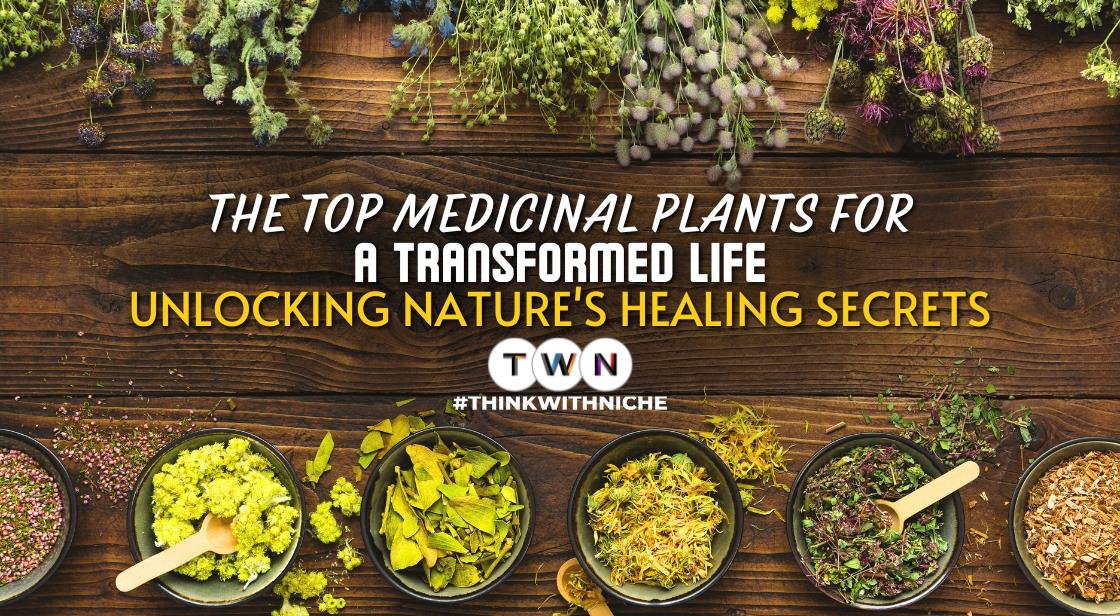The Top Medicinal Plants for a Transformed Life: Unlocking Nature's Healing Secrets

Blog Post
In a world often inundated with synthetic medications and manufactured remedies, the allure of returning to nature for healing has never been stronger. Unlocking Nature's Healing Secrets takes you on a journey into the realm of medicinal plants, exploring the transformative power they possess to enhance and enrich our lives.
Nature has long been our greatest ally in matters of health, offering a bounty of botanical treasures that hold the key to wellness and vitality.
At the heart of this exploration are the top medicinal plants, revered for their remarkable healing properties and profound impact on human health. These plants, rooted in centuries of traditional medicine and backed by modern scientific research, stand as testaments to nature's unparalleled ability to nurture and heal.
Each plant featured in this guide is a gateway to a world of wellness, offering not only relief from ailments but also the promise of a transformed life. From the soothing properties of aloe vera to the mood-boosting effects of St. John's Wort, these botanical wonders have the potential to revolutionize our approach to healthcare, offering gentle yet potent alternatives to conventional treatments.
As we delve into the world of medicinal plants, we uncover not only their therapeutic benefits but also the wisdom of ancient healing traditions passed down through generations. Through this journey, we reconnect with the natural world and rediscover the profound connection between humanity and the plant kingdom.
Join us as we embark on a voyage of discovery, unlocking the healing secrets of nature's most extraordinary plants and embracing a life transformed by their power and potency.
Discover the Magic of Medicinal Plants: Transforming Lives, One Leaf at a Time
-
Aloe Vera
The Scientific name for Aloe Vera-
Aloe barbadensis Miller
Aloe Vera Known for its soothing properties, aloe vera is commonly used to treat burns, wounds, and skin irritations.
Soothing Properties: Aloe vera is renowned for its soothing qualities, primarily due to its gel-like substance found in the leaves. This gel contains numerous bioactive compounds, such as vitamins, enzymes, minerals, and amino acids, which contribute to its therapeutic effects.
Burn Treatment: Aloe vera is widely utilized for treating burns, including sunburns and minor thermal burns. When applied topically, its cooling sensation helps alleviate pain and inflammation. Additionally, its moisturizing properties aid in preventing the skin from drying out and promote faster healing.
Wound Healing: Aloe vera's ability to enhance wound healing is attributed to its anti-inflammatory and antimicrobial properties. It helps reduce swelling and redness around the wound while protecting against infection by inhibiting the growth of harmful bacteria.
Skin Irritation Relief: Various skin irritations, such as rashes, itching, and allergic reactions, can benefit from aloe vera's soothing properties. Its gentle nature makes it suitable for sensitive skin, providing relief without causing further irritation or adverse reactions.
Mechanism of Action: The polysaccharides present in aloe vera gel stimulate skin regeneration by promoting the production of collagen and elastin fibers. These compounds contribute to tissue repair and contribute to the skin's overall health and resilience.
Versatile Application: Aloe vera products come in various forms, including gels, creams, lotions, and ointments, making them convenient for different applications. Whether used alone or as an ingredient in skincare products, aloe vera offers versatile solutions for addressing a range of skin concerns.
Overall, aloe vera's multifaceted benefits make it a valuable natural remedy for addressing burns, wounds, and various skin irritations, promoting healing and providing relief
-
Turmeric
The scientific name of turmeric-
Curcuma longa.
Turmeric: This vibrant yellow spice contains curcumin, which has powerful anti-inflammatory and antioxidant properties. It's used to treat a variety of conditions, including arthritis and digestive issues.
Vibrant Yellow Spice: Turmeric is a spice derived from the Curcuma longa plant, which is native to Southeast Asia. It has a distinctive bright yellow color and is commonly used in cooking to add flavor and color to dishes, particularly in Indian cuisine.
Curcumin Content: The active compound in turmeric responsible for its medicinal properties is curcumin. Curcumin is a polyphenol with potent anti-inflammatory and antioxidant effects.
Anti-inflammatory Properties: The potential of curcumin to lessen inflammatory responses in the body has been well investigated. Numerous illnesses, such as cancer, heart disease, and arthritis are associated with chronic inflammation.
By inhibiting inflammatory pathways, curcumin may help alleviate symptoms of inflammatory conditions like arthritis and rheumatoid arthritis.
Antioxidant Effects: Turmeric's curcumin content also contributes to its antioxidant properties. Antioxidants help neutralize harmful free radicals in the body, which can damage cells and contribute to aging and disease development.
By scavenging free radicals, curcumin may help protect against oxidative stress and reduce the risk of chronic diseases.
Treatment of Arthritis: Due to its anti-inflammatory properties, turmeric is often used as a natural remedy for arthritis. Studies have shown that curcumin supplementation can help reduce joint pain, stiffness, and swelling in individuals with osteoarthritis and rheumatoid arthritis.
Digestive Benefits: Turmeric is also believed to aid digestion and promote gastrointestinal health. It may help alleviate symptoms of digestive disorders like indigestion, bloating, and gas. Additionally, turmeric may support liver function and protect against liver damage.
Overall, turmeric's active compound, curcumin, offers a wide range of health benefits, making it a valuable addition to both culinary and medicinal practices.
-
Peppermint
The scientific name of peppermint-
Mentha × piperita.
Peppermint: Peppermint leaves contain menthol, which can help alleviate digestive discomfort, headaches, and even improve mental focus.
Menthol Content: Peppermint leaves contain menthol, a compound with various therapeutic properties. Menthol has a cooling sensation when applied or ingested, making it effective for several health issues.
Alleviating Digestive Discomfort: Menthol has a relaxing effect on the muscles of the digestive tract, which can help relieve symptoms of indigestion, bloating, gas, and stomach cramps. Peppermint tea or oil is commonly used for these purposes.
Headache Relief: Peppermint's ability to relax muscles extends to the blood vessels in the head. When applied topically or inhaled via aromatherapy, peppermint oil may help alleviate tension headaches and migraines by promoting better blood flow and reducing muscle tension.
Improving Mental Focus: The invigorating scent of peppermint has been shown to have cognitive benefits. Inhaling the aroma of peppermint essential oil may help increase alertness, concentration, and cognitive performance. Some studies suggest that it can even enhance memory retention and accuracy.
Enhancing Respiratory Health: The menthol in peppermint has mild decongestant properties, which can help clear nasal passages and relieve respiratory symptoms associated with conditions like colds, allergies, and sinusitis.
Peppermint oil steam inhalation or peppermint tea can be beneficial in easing congestion and promoting easier breathing.
Anti-inflammatory Effects: Peppermint contains compounds with anti-inflammatory properties, which may help reduce inflammation in the body. This can be particularly useful for conditions like irritable bowel syndrome (IBS), where inflammation in the gut contributes to symptoms.
Overall, peppermint's menthol content makes it a versatile remedy for a range of health issues, from digestive discomfort to headaches and mental focus.
However, it's essential to use peppermint products appropriately and in moderation to avoid potential side effects, especially for those with sensitivities or specific health conditions.
Also Read: The Story of L'Oréal – From Hair Dyes to Cosmetic Giant
-
Lavender
The scientific name for lavender-
Lavandula.
Lavender: Lavender is famous for its calming scent, which can help reduce anxiety and promote relaxation. It's also used topically to soothe skin irritations.
Calming Scent: Lavender is renowned for its delightful aroma, which has been scientifically proven to have a calming effect on the mind and body. The scent of lavender has a soothing effect on the nervous system, helping to reduce feelings of anxiety and stress.
Anxiety Reduction: Inhalation of lavender essential oil or the scent of fresh lavender flowers can help alleviate symptoms of anxiety and promote relaxation. Research suggests that lavender may have anxiolytic (anxiety-reducing) effects, making it a popular choice for aromatherapy and relaxation techniques.
Promotion of Relaxation: Lavender's calming properties make it an excellent tool for promoting relaxation and improving sleep quality. Using lavender essential oil in a diffuser before bedtime or adding a few drops to a warm bath can create a tranquil environment conducive to relaxation and restful sleep.
Topical Use for Skin Irritations: In addition to its aromatic benefits, lavender is also used topically to soothe various skin irritations. Lavender essential oil has anti-inflammatory and antiseptic properties, making it effective for treating minor burns, cuts, insect bites, and rashes.
Diluted lavender oil can be applied directly to the affected area to help reduce inflammation and promote healing.
Wound Healing: Lavender's antimicrobial properties make it useful for promoting wound healing. Applying diluted lavender oil to minor wounds or abrasions can help prevent infection and reduce the risk of scarring.
Overall, lavender is a versatile medicinal plant that offers both aromatic and topical benefits, making it a valuable addition to natural health and wellness practices.
-
Ginger
The scientific name of ginger-
Zingiber officinale.
Ginger: Ginger root is known for its anti-nausea properties and is commonly used to alleviate motion sickness, morning sickness during pregnancy, and nausea caused by chemotherapy.
Anti-nausea Properties: Ginger root contains compounds such as gingerol and shogaol, which have been shown to have anti-nausea effects. These compounds work by blocking certain receptors in the gastrointestinal tract and the brain that are involved in triggering nausea and vomiting.
Alleviation of Motion Sickness: Motion sickness occurs when the inner ear, eyes, and other sensory organs send conflicting signals to the brain, resulting in nausea and vomiting. Ginger has been used for centuries as a natural remedy for motion sickness, with studies supporting its effectiveness.
Consuming ginger in various forms, such as raw, powdered, or in tea, can help alleviate symptoms of motion sickness during travel.
Morning Sickness During Pregnancy: Many pregnant women experience morning sickness, which is characterized by nausea and vomiting, particularly during the first trimester. Ginger has been found to be a safe and effective remedy for relieving morning sickness.
Pregnant women can consume ginger in different forms, such as ginger tea or ginger candies, to help reduce nausea and improve overall comfort during pregnancy.
Nausea Caused by Chemotherapy: Chemotherapy treatments can often cause severe nausea and vomiting as side effects. Ginger has shown promise in alleviating chemotherapy-induced nausea and vomiting when used in conjunction with standard anti-nausea medications.
It is believed that ginger's anti-inflammatory and antiemetic properties contribute to its effectiveness in reducing chemotherapy-related nausea.
Versatile Usage: One of the advantages of ginger as a medicinal plant is its versatility. It can be consumed fresh, dried, powdered, or as a supplement, making it accessible and easy to incorporate into various diets and lifestyles.
Additionally, ginger can be used in cooking or brewed into tea, providing multiple options for consumption based on individual preferences and needs.
-
Garlic
The Scientific name for garlic-
Allium sativum
Garlic: Allicin, a substance with powerful therapeutic effects, is found in garlic. It's used to boost the immune system, lower blood pressure, and reduce the risk of heart disease.
Allicin Compound: Garlic contains a compound called allicin, which is formed when garlic cloves are crushed, chopped, or chewed. Allicin is responsible for many of garlic's health benefits due to its potent medicinal properties.
-
Allicin exhibits antimicrobial properties, helping to combat various infections caused by bacteria, viruses, fungi, and parasites. It can be effective against common illnesses like colds and flu.
Immune System Booster: Garlic is renowned for its ability to enhance the immune system's function. Allicin, along with other sulfur compounds in garlic, stimulates the activity of immune cells such as macrophages and lymphocytes, which play crucial roles in defending the body against pathogens.
-
By bolstering the immune response, garlic may help reduce the frequency and severity of infections, including respiratory infections like the common cold.
Blood Pressure Reduction: Studies suggest that garlic consumption can help lower blood pressure levels, particularly in individuals with hypertension (high blood pressure). Allicin and other sulfur compounds in garlic promote the relaxation of blood vessels, leading to improved blood flow and reduced pressure on arterial walls.
-
Regular consumption of garlic, whether raw, cooked, or in supplement form, may contribute to modest but significant reductions in both systolic and diastolic blood pressure.
Heart Disease Risk Reduction: Garlic has been linked to a reduced risk of heart disease, the leading cause of death worldwide. Its beneficial effects on cardiovascular health are multifaceted:
-
Garlic helps lower levels of LDL (bad) cholesterol in the blood, thereby reducing the risk of atherosclerosis (hardening of the arteries) and coronary artery disease. It also appears to raise levels of HDL (good) cholesterol, further protecting against heart disease.
-
Additionally, garlic exhibits antioxidant properties, scavenging harmful free radicals that can damage blood vessels and contribute to heart disease development.
garlic's medicinal properties, primarily attributed to its allicin content, include immune system enhancement, blood pressure reduction, and lowering the risk of heart disease. Regular consumption of garlic as part of a balanced diet may offer significant health benefits.
-
Echinacea
The scientific name for Echinacea-
Echinacea purpurea.
Echinacea: Echinacea is a popular herb used to support the immune system and reduce the severity and duration of colds and other respiratory infections.
Echinacea, also known as purple coneflower, is a flowering plant native to North America. It has been used for centuries by indigenous peoples for its medicinal properties.
Immune Support: One of the primary uses of Echinacea is to support the immune system. It contains active compounds, such as polysaccharides, flavonoids, and alkamides, which are believed to stimulate the immune system's response to infections.
Cold and Respiratory Infections: Echinacea is particularly renowned for its ability to reduce the severity and duration of colds and other respiratory infections.
Studies suggest that taking Echinacea supplements at the onset of cold symptoms can help shorten the duration of the illness and alleviate symptoms such as coughing, sneezing, and congestion.
Mechanism of Action: The exact mechanism by which Echinacea boosts the immune system and fights infections is not fully understood. However, research indicates that it may enhance the activity of white blood cells, which are crucial for fighting off pathogens.
Varieties: There are several species of Echinacea used for medicinal purposes, including Echinacea purpurea, Echinacea angustifolia, and Echinacea pallida. Each species may have slightly different chemical compositions and therapeutic effects.
Forms of Administration: Echinacea supplements are available in various forms, including capsules, tablets, liquid extracts, and teas. Some people also use Echinacea tinctures applied topically to treat wounds and skin infections.
Safety and Side Effects: Echinacea is generally considered safe for short-term use, but long-term safety data is limited. Common side effects may include gastrointestinal upset, allergic reactions, and interactions with certain medications.
It's essential to consult with a healthcare professional before starting any herbal supplement regimen, especially if you have underlying health conditions or are taking medications.
-
Chamomile:
The Scientific name for chamomile-
Matricaria chamomilla
Chamomile: Chamomile is well-known for its calming effects and is often used to promote relaxation, improve sleep quality, and soothe digestive issues.
Calming Effects: Chamomile is renowned for its ability to induce a sense of calmness and relaxation. It contains compounds like apigenin, which bind to receptors in the brain, promoting relaxation and reducing anxiety levels.
Improved Sleep Quality: Due to its calming properties, chamomile is often consumed as a tea before bedtime to improve sleep quality. It helps to alleviate insomnia by relaxing the muscles and mind, making it easier to fall asleep and stay asleep throughout the night.
Soothing Digestive Issues: Chamomile has been used for centuries to treat various gastrointestinal problems, including indigestion, gas, bloating, and stomach cramps. It contains anti-inflammatory and antispasmodic properties that help to relax the muscles of the digestive tract, reducing discomfort and promoting healthy digestion.
Anti-inflammatory Properties: Compounds with anti-inflammatory qualities such as terpenoids and flavonoids are found in chamomile. These compounds help to reduce inflammation in the body, making chamomile beneficial for conditions such as inflammatory bowel disease (IBD) and gastritis.
Antioxidant Benefits: Chamomile is rich in antioxidants, such as chamazulene and flavonoids, which help to protect the body from oxidative stress and damage caused by free radicals. Regular consumption of chamomile tea or extracts may help to prevent chronic diseases and slow down the aging process.
Skin Health: Chamomile has mild antiseptic and anti-inflammatory properties, making it beneficial for skin health. It can be used topically to soothe skin irritations, such as eczema, psoriasis, and sunburns, as well as to speed up wound healing.
Overall, chamomile offers a holistic approach to health and well-being, providing relief for both the mind and body through its calming, digestive, anti-inflammatory, and antioxidant properties.
-
Ginseng
Ginseng: Ginseng root is prized for its ability to boost energy levels, improve mental clarity, and enhance overall vitality.
Boosts Energy Levels: Ginseng is well known for its capacity to increase vitality and fight exhaustion. It achieves this by stimulating the central nervous system, leading to increased alertness and stamina. This makes it a popular choice for individuals seeking a natural energy boost without the jittery side effects often associated with caffeine.
Improves Mental Clarity: Ginseng is believed to enhance cognitive function and mental clarity. Research suggests that the active compounds in ginseng, known as ginsenosides, may improve memory, concentration, and overall cognitive performance.
-
By promoting healthy blood flow to the brain and supporting neurotransmitter activity, ginseng may help individuals feel more mentally sharp and focused.
Enhances Overall Vitality: Regular consumption of ginseng is associated with an overall improvement in vitality and well-being. Its adaptogenic properties enable it to help the body adapt to stressors and maintain balance, thus supporting overall health and resilience.
-
Ginseng is often used by individuals looking to improve their overall quality of life and vitality, especially during periods of increased physical or mental exertion.
Supports Immune Function: Ginseng is believed to possess immune-boosting properties, helping to strengthen the body's natural defense mechanisms.
- By modulating the immune response and enhancing the activity of immune cells, ginseng may help reduce the risk of infections and support faster recovery from illness.
Antioxidant Effects: Ginseng contains powerful antioxidants that help protect cells from damage caused by free radicals. This antioxidant activity may contribute to its anti-aging effects and its ability to promote overall health and longevity.
Ginseng root offers a range of benefits, including increased energy, improved mental clarity, enhanced vitality, immune support, and antioxidant protection. These properties make it a popular choice for individuals seeking natural ways to optimize their physical and mental well-being.
-
St. John's Wort
The Scientific name of St. John's Wort-
Hypericum perforatum
St. John's Wort: This herb is used to treat mild to moderate depression and anxiety. It's thought to function by raising serotonin levels in the brain. However, it can interact with certain medications, so it's important to consult a healthcare professional before using it.
Usage for Depression and Anxiety: St. John's Wort is a herbal remedy often utilized to alleviate symptoms of mild to moderate depression and anxiety. It has been traditionally used for centuries for its potential mood-boosting properties.
Mechanism of Action: The herb is believed to exert its antidepressant effects by increasing the levels of serotonin in the brain. Serotonin is a neurotransmitter associated with mood regulation, and higher levels are often correlated with improved mood and reduced feelings of depression and anxiety.
Caution Regarding Medication Interactions: St. John's Wort can interact with certain medications, particularly those metabolized by the liver enzymes CYP3A4 and CYP2C9. These interactions can lead to either decreased effectiveness of the medication or increased risk of side effects.
Examples of Interactions: Some medications that may interact with St. John's Wort include antidepressants, birth control pills, blood thinners, and certain HIV medications. When taken concurrently with St. John's Wort, these medications may be metabolized more quickly in the body, reducing their effectiveness.
Consultation with Healthcare Professional: Due to the potential for interactions with medications, it's crucial for individuals considering St. John's Wort supplementation to consult with a healthcare professional before use.
A doctor or pharmacist can assess the individual's medical history and current medications to determine whether St. John's Wort is a safe option and provide guidance on proper dosing and monitoring for any adverse effects.
Adherence to Recommended Dosage: Even for individuals not taking medications, it's important to adhere to the recommended dosage of St. John's Wort to minimize the risk of side effects and ensure its safe use as a complementary treatment for depression and anxiety.
You May Like
EDITOR’S CHOICE












